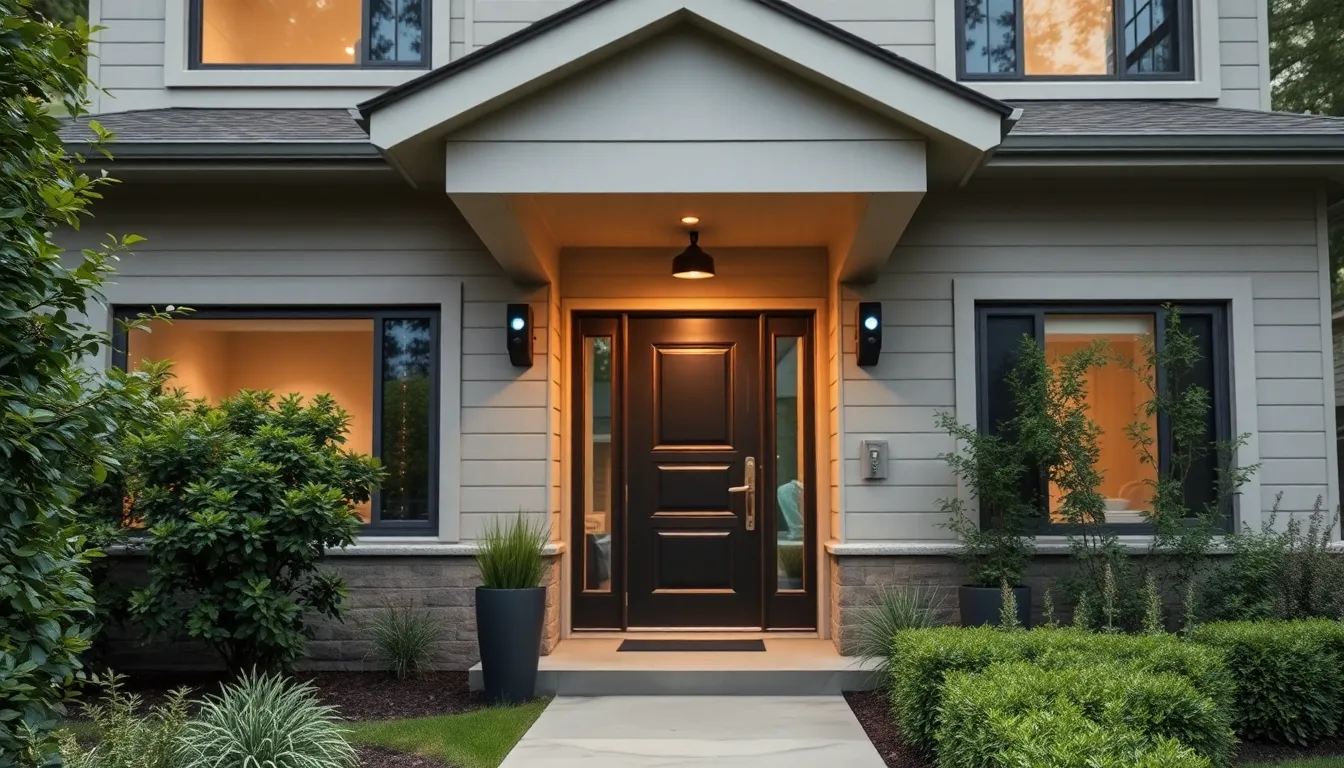In a world where doorbells can now tell you who’s at the door before you even get off the couch, home security has never been more crucial. With the rise of technology, it’s easy to feel like a superhero in your own fortress, but not all heroes wear capes—some just install smart locks and cameras.
Table of Contents
ToggleOverview of Home Security
Home security plays an essential role in safeguarding residences. It encompasses a variety of systems and practices designed to deter burglaries and protect against intrusions. Smart technology has transformed how homeowners approach security, making it more accessible and efficient.
Smart cameras allow real-time monitoring of properties, enabling immediate awareness of potential threats. Sensors installed on doors and windows send alerts if accessed without authorization, providing peace of mind. Many systems integrate seamlessly with smartphones, creating a connected experience for homeowners.
Locks that feature advanced technology add another layer of protection. Smart locks eliminate the need for traditional keys, offering keyless entry options. Homeowners can control access remotely, which is convenient when managing guests or service personnel.
Investing in home security systems correlates directly with reduced theft rates. Research shows that homes without security measures are 300% more likely to be burglarized. This data underscores the urgency for individuals to consider protective options.
The implementation of lighting systems also enhances security. Well-lit entrances and walkways deter potential intruders. Motion-activated lights draw attention, creating an unpredictable environment for would-be burglars.
To maximize security effectiveness, combining various measures often yields the best results. Integrated systems that include alarms, cameras, and smart technology offer comprehensive protection. Proactive behavior, such as regular maintenance checks on security devices, reinforces a secure environment.
Prioritizing home security fosters safety and protection. By leveraging modern technology and comprehensive systems, homeowners can significantly minimize risks associated with potential intrusions.
Types of Home Security Systems

Home security systems come in various types, each designed to enhance safety and protect residences. Homeowners can choose from solutions like alarm systems, surveillance cameras, and smart home integration to achieve comprehensive security coverage.
Alarm Systems
Alarm systems serve as the frontline of home security. Security alarms detect unauthorized entry and notify homeowners immediately. A variety of options exist, including wired and wireless systems. Wireless systems offer flexibility in placement, while wired systems provide a robust connection. Many modern alarms integrate with monitoring services, providing 24/7 surveillance. Research indicates homes with alarm systems are less likely to be targeted by burglars.
Surveillance Cameras
Surveillance cameras play a crucial role in monitoring and recording activities around a property. Homeowners can opt for indoor and outdoor cameras to ensure comprehensive coverage. High-definition and night vision capabilities enhance visibility during low light conditions. Remote monitoring features allow users to access live feeds via smartphones. Statistics show that the mere presence of cameras can deter criminal activity. Choosing cameras with motion detection adds an extra layer of safety.
Smart Home Integration
Smart home integration elevates traditional security systems through advanced technology. Devices like smart locks, doorbell cameras, and smart sensors communicate seamlessly within a network. Many systems allow homeowners to control their security features remotely. Real-time alerts inform users of any suspicious activity. Integration with smart assistants enhances usability, offering voice command options. Evidence suggests that homes equipped with smart security solutions experience lower burglary rates.
Benefits of Home Security
Home security systems offer multiple advantages that significantly enhance safety and protection for homeowners. Key benefits encompass crime deterrence, peace of mind, and potential insurance savings.
Deterrence of Crime
Many studies show that homes equipped with security systems are less likely to be targeted by burglars. Alarm systems and visible cameras signal to intruders that a home is protected. Increased neighborhood safety often occurs when multiple homes adopt security measures. Security signs or stickers can also work as effective deterrents, discouraging criminal activity before it starts. Overall, the presence of security technology fosters a sense of safety and community vigilance.
Peace of Mind
Security systems provide homeowners with unmatched peace of mind. Knowing that protection is in place allows individuals to focus on their daily activities without constant worry. Real-time monitoring and remote access features ensure alerts for any suspicious activities. Homeowners can feel secure whether they are at home or away. The reassurance of rapid response from authorities in case of emergencies further enhances a sense of safety. Ultimately, home security contributes to a more relaxed living environment.
Insurance Benefits
Insurance providers recognize the lower risk associated with homes that have security systems. Many companies offer discounts on homeowner’s insurance for installations of alarms and cameras. This financial incentive can result in significant annual savings. Documenting security features for insurance policies also proves beneficial during claims processes. Enhanced security measures reduce the likelihood of theft, directly affecting premiums. Prioritizing home security not only boosts safety but can lead to tangible financial benefits as well.
Choosing the Right Home Security System
Selecting an appropriate home security system requires careful consideration of various factors. Making informed choices ensures optimal protection.
Assessing Your Needs
Determine security requirements by evaluating property size and layout. Identify high-risk areas, such as entry points and windows. Assess lifestyle factors, including travel frequency. Homeowners in busier neighborhoods might require more comprehensive systems. Consider whether real-time monitoring or remote access fits daily routines. Installing smart technology may benefit those who prioritize convenience. Balance personal preferences with physical security needs to develop an effective strategy.
Budget Considerations
Establishing a budget is crucial for selecting a suitable home security system. Evaluate initial costs, installation fees, and ongoing monitoring expenses. High-quality systems often have higher upfront costs but may offer long-term savings on insurance premiums. Additionally, consider potential costs for smart home integrations and future upgrades. Exploring financing options can help manage the overall investment. Prioritize essential features to ensure adequate protection without financial strain. Balancing needs with financial capabilities creates a practical security plan.
Home security is no longer a luxury but a necessity in today’s world. By embracing modern technology and proactive measures, homeowners can significantly enhance their safety and peace of mind. Investing in smart locks cameras and alarm systems not only deters potential intruders but also fosters a sense of community vigilance.
Choosing the right security system tailored to individual needs can lead to both immediate and long-term benefits. With the right approach homeowners can create a secure environment that protects their loved ones and belongings while potentially saving on insurance costs. Prioritizing home security is a smart decision that pays off in numerous ways, ensuring that peace of mind is just a click away.


